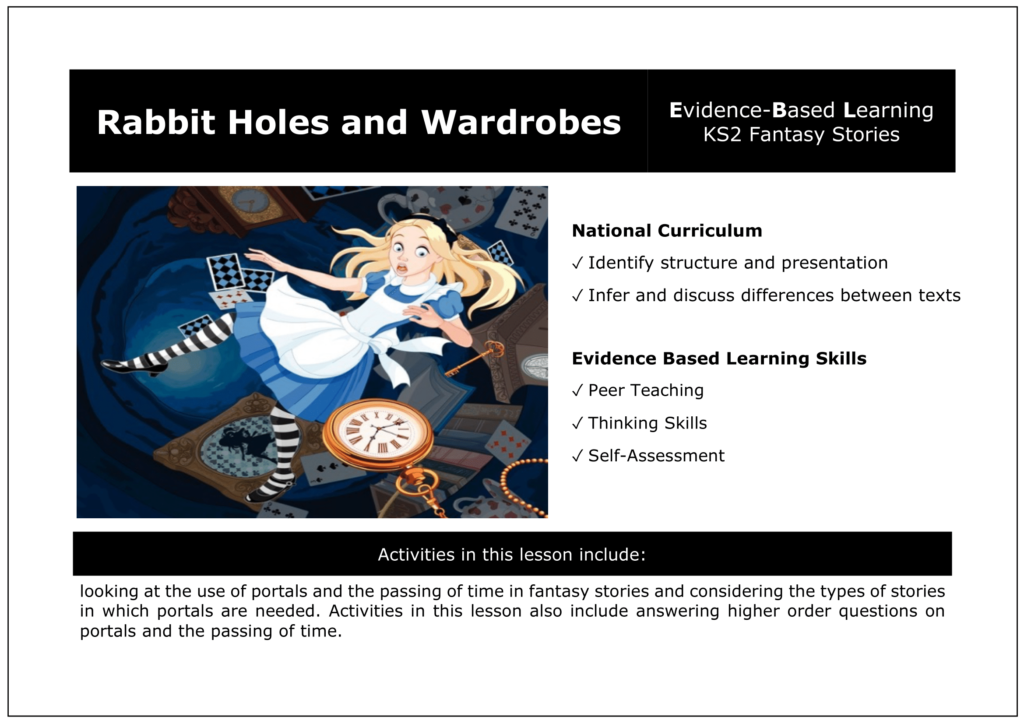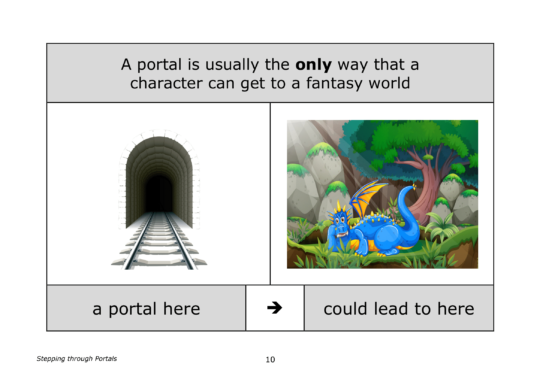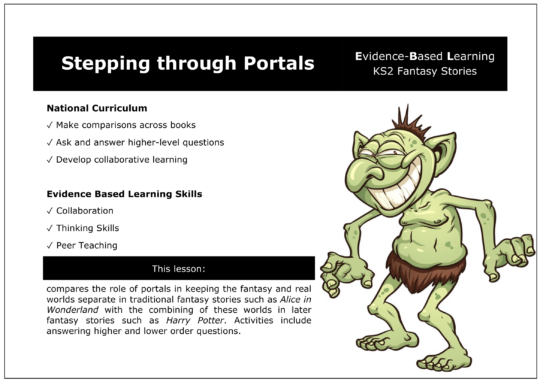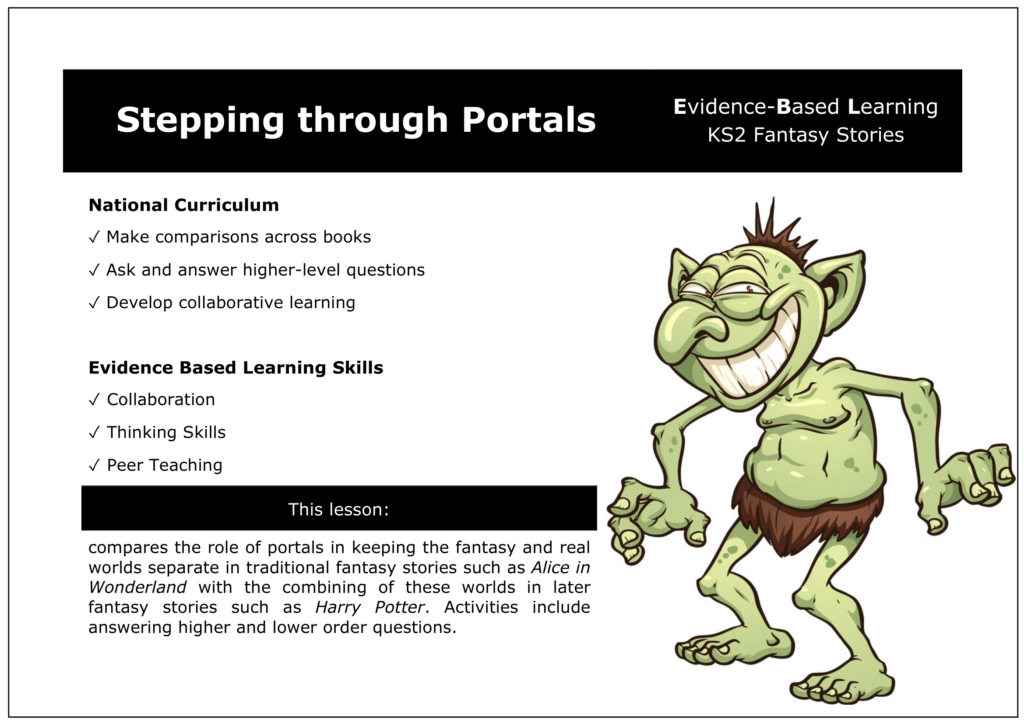Y5 Alice in Wonderland
£3.00
KS2 National Curriculum:
✓ Develop positive attitudes to reading
✓ Inference from characters
✓ Build vocabulary and comprehension
Activities in this lesson include recapping the key features of fantasy stories, such as real and imaginary settings, real and imaginary characters, portals and the passing of time. The activities in this lesson also include answering higher and lower order questions.
There is a five-minute evidence-based CPD activity at the end of this lesson which will develop classroom teachers’ skill set. This CPD consists of a research extract on peer teaching with a five-minute activity based on this extract.
Description
These evidence-based learning (EBL) lessons are based on classroom practice that has been proven, by research, to maximise thinking, learning and attainment. From an extensive review of educational research, we identified the eight key classroom thinking and learning skills that were common across these research papers. We named these eight key skills “EBL skills”.
EBL skills have been proven by research to maximise learning because they combine the most productive thinking skills with the most effective learning behaviours. Each of our evidence-based learning lessons uses the English curriculum as a framework through which the eight EBL skills are delivered.
Teachers also have the opportunity to add to their own skill set or refresh their existing skills with our five-minute CPD activity, based on one of the EBL skills used in this lesson.
The skills in bold below are the EBL skills developed in this Fantasy Story lesson. Click on each skill to learn more about that skill.
- Collaboration
- Thinking Skills
- Peer Assessment
- Peer Teaching
- Self-Assessment
- Metacognition
- Self-Regulation
- Independent Learning
1 review for Y5 Alice in Wonderland
Only logged in customers who have purchased this product may leave a review.
Related products
-


Y5 Home Sweet Dome
£3.00 Add to basket £3.00Add to basket
£3.00Add to basketKS2 National Curriculum:
✓ Describing settings; using expanded noun phrases and rich vocabulary.
This lesson looks at settings in a science fiction story in detail, and it includes answering higher and lower order questions on the settings of a science fiction story, reading extracts from science fiction stories and identifying the setting of these extracts.
There is a five-minute evidence-based CPD activity at the end of this lesson which will develop classroom teachers’ skill set. This CPD consists of a research extract on peer assessment with a five-minute activity based on this extract.
VIEW -


Y5 Rabbit Holes and Wardrobes
£3.00 Add to basket £3.00Add to basket
£3.00Add to basketKS2 National Curriculum:
✓ Identify structure and presentation
✓ Infer and discuss differences between textsActivities in this lesson include looking at the use of portals and the passing of time in fantasy stories and considering the types of stories in which portals are needed. Activities in this lesson also include answering higher order questions on portals and the passing of time.
There is a five-minute evidence-based CPD activity at the end of this lesson which will develop classroom teachers’ skill set. This CPD consists of a research extract on self-assessment with a five-minute activity based on this extract.
VIEW -


Y5 Robots Got Talent
£3.00 Add to basket £3.00Add to basket
£3.00Add to basketKS2 National Curriculum:
✓ Identifying structure and themes; participating in discussions and presentations.
Activities in this lesson include learning about common themes for science fiction stories, the structure of a science fiction story, the main features of science fiction stories, how to design a poster and creating a poster showing the key features of science fiction stories.
There is a five-minute evidence-based CPD activity at the end of this lesson which will develop classroom teachers’ skill set. This CPD consists of a research extract on peer assessment with a five-minute activity based on this extract.
VIEW -


Y6 Stepping through Portals
£3.00 Add to basket £3.00Add to basket
£3.00Add to basketKS2 National Curriculum:
✓ Make comparisons across books
✓ Ask and answer higher-level questions
✓ Develop collaborative learningThis lesson compares the role of portals in keeping the fantasy and real worlds separate in traditional fantasy stories such as Alice in Wonderland with the combining of these worlds in later fantasy stories such as Harry Potter. Activities include answering higher and lower order questions.
There is a five-minute evidence-based CPD activity at the end of this lesson which will develop classroom teachers’ skill set. This CPD consists of a research extract on peer teaching with a five-minute activity based on this extract.
VIEW






Philipem (verified owner) –
We asked a.i. to review this lesson. This is what it said:
Teach English and Evidence-Based Learning Skills with Alice in Wonderland
I want to highlight a fantastic English and evidence-based learning resource for KS2 classes – this complete Alice in Wonderland lesson. It incorporates teaching key features of the fantasy genre, while simultaneously developing essential learning skills like collaboration, metacognition and peer teaching.
In this comprehensive lesson, students recap:
– Real vs imaginary settings
– Real vs imaginary characters
– Portals to fantasy worlds
– How time passes differently in fantasy
The well-designed activities allow students to actively engage with these concepts, answering higher and lower order questions individually, in pairs and as a class.
An excellent aspect is the inclusion of a 5 minute CPD extract on the benefits of peer teaching. This gives you an evidence-based strategy to immediately implement in your classroom. The CPD consists of:
– A research summary on peer learning
– Clear action steps to leverage peer teaching
As a ready-to-use resource that builds both literacy skills and learning skills, I would give this fantasy story lesson 5 stars. Your students will love stepping into the magical world of Alice in Wonderland, while developing collaboration, critical thinking and metacognition.
I highly recommend adding this resource to your KS2 fantasy lessons! Both you and your students will benefit tremendously.